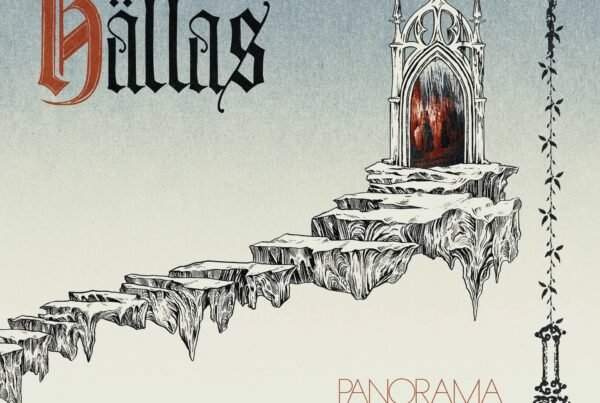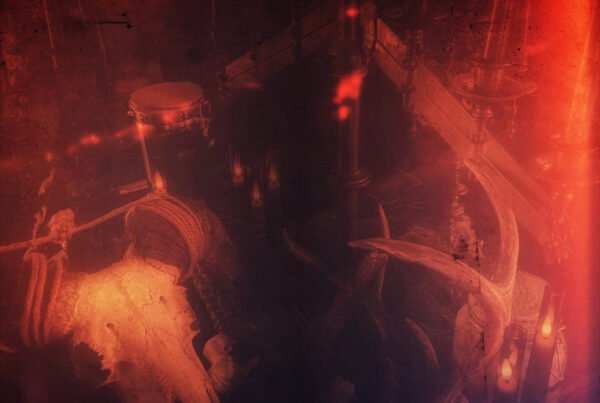The enigmatic Esoctrilihum has eclipsed all previous efforts with this sprawling saga of gods, demons, war, and of course, riffs.
Release date: May 12, 2023 | I, Voidhanger | Bandcamp | Facebook | Webstore
This one is a beast. An astral god-beast languishing in some alternate dimension until it can be unleashed upon the unknowing, but still a beast nonetheless. If you have had any encounters with the entity that is Esoctrilihum in the past it will come as no surprise to you that this act is prolific with only one album per year being released through I, Voidhanger, the rest being independently issued. Since 2017, Asthâghul (the band’s sole member) has released 9 full length albums and with most hovering around an hour of music and while that’s an impressive feat by any right the fact that the majority of it is quality stuff is even more impressive. Well, Asthâghul has completely outdone himself with Astraal Constellations of the Majickal Zodiac, the tenth album in the last 5 years or so. While many of his releases from the past have flirted with the hour mark, this one is essentially a triple album: three parts released as one large conceptual odyssey. Each of these parts – In The Mystic Trance of Tȃimonh Ѳx, the Cosmic Bull God; In the Presence of AlŭBḁḁl, the 5-Eyed Star Beast; and In the Mouth of Zi-Dynh-Gtir, the Serpen-Time Eater – total up to over two hours and ten minutes of raw, interdimensional black metal.
This sort of approach isn’t necessarily novel, after all Esoctrilihum’s label mate Midnight Odyssey has been releasing albums that border on two hours for a while. This is however a new venture for Esoctrilihum that somehow seems overdue in some ways. The mythology that Asthâghul has created for his music seems to only fit within these larger contexts making a release such as this feel natural and apt. Given that each of these albums are a vertical slice of his larger universe, I think it only fitting that I try to look at each album as a whole as well as collectively which has proven to be challenging but worth it. Let us begin with the cosmic bull.
Part I – In The Mystic Trance of Tȃimonh Ѳx, the Cosmic Bull God
In the first chapter of this seemingly ever-unfolding saga from Esoctrilihum, the visions that the listener are met with are formed by the narrator’s encounters with interdimensional gods which imbue him with suffering, particles of blood from a lost civilization, and signs of fire. I guess I should point out now that if you’re not down with borderline unhinged neo-spirituality and cosmic theology based around visions of unfathomable and incomprehensible interdimensional gods, you’re going to have a hard time with this album, and this review. Comprised of six songs, “Arcane Majestrïx Noir” peels back the first layer of the fabric of reality in an effort to acclimate the listener to the harrowing world that lies just out of focus. There’s an immediacy to this track that attempts to calibrate us to how feral and cold this other dimension will be. Asthâghul’s vocals are as fierce as ever and storm the ramparts immediately with layers of clean spoken words being added during the moments which benefit from this. From a technical standpoint this is a brilliant sounding song where the production shines a light on the additional effects, vocals, riffs, and drums giving this song – and by extension the album as a whole – a rich full sound.
While the edge remains sharp throughout this first chapter there are moments that lend themselves to the softer side of this alternate universe such as the string-led riff on “Atlas Eeïm” which refrains often and this repetition could signal the moments when the Tȃimonh Ѳx is teaching the witness the ‘art of suffering.’ Or maybe it’s something else entirely. What is true, however, is elements such as these – and the track named for the Bull God himself, “Tȃiɱonh Ѳx” are extraordinarily beautiful and are among some of the most lush and textured songs in the short-but-prolific career of Esoctrilihum. Transcendent melodies echoed by guitar and strings give this chapter a sense of elevation and divinity while the harsher moments remind that while these gods may be beautiful, they are far from safe.
Perhaps the pinnacle of this introductory album is the final track (or track six of 18 if you’re counting that way) “Uran-Ѳx Death Star.” While the formula is relatively unchanged from the majority of what precedes it there are moments when the vocalizations of horror or perhaps worship feel especially vehement and penitent at the same time. The orchestration sits atop the song and guides it through the first phase until guitars wrest control and guide the song to an even more intense section where vocals are pushed so far forward that it felt as if Asthâghul was sitting beside me, bellowing into my ear. As this chapter closes and we pass into the next realm, I can’t help but be enamored by what I have witnessed but not knowing what wonders of this astral plane await give me only slight reticence. The journey is just beginning.
Part II – In the Presence of AlŭBḁḁl, the 5-Eyed Star Beast
It is at this point in the story where, according to our witness, the war begins in earnest. Battle mages, city-wide defenses, and the 5-Eyed Star Beast has descended to commemorate the Hour of Repentance. I was expecting the intensity from Esoctrilihum to rise during this centerpiece album, given the context of war in the heavens and while that was true, it was not the only new set of emotions that were felt throughout its runtime. “Shadow Lupus of Sæmons-Tuhr” sees the aforementioned aggression but also tinkers with triumph. Horns ring out defiantly, chants signal fortitude, and the rhythmic beat of this song is a march if ever there was one. The tumult of battle is palpable from this point on, living up to the idea that the center chapter in almost every trilogy is the darkest.
“Lunḁḁr Phalanx of Ω Draco” is the midpoint of Part II and by extension the center of this triple release and this song while on around six minutes captures so much of what this release is about. The intensity is there throughout but the contrasting lighter moments and lulls in battle add some welcome dynamics. As a metal fan, this song has all the things that I love in black metal: riffs, grooves, seething vocals, orchestration, and more. Beyond that, however, the emotional resonance during this tale is palpable.
The early moments of Part II resonated with me greatly. With the war heating up, you could feel the apprehension, the wheels turning, and by the end of this center chapter the war has scorched the heavens and left the cosmos on fire. “Säth-Oxd, Stellar Basilisk” is an uncommonly bright song at the start with a gorgeous synth riff introducing the song and remains a highlight of the album as a whole. The lamentations continue with “Omniversal Zodiac War” and as the battle fades with this centerpiece, rebirth is about to begin.
Part III – In the Mouth of Zi-Dynh-Gtir, the Serpen-Time Eater
The final chapter has begun and the cycle is nearing its conclusion. This is the final movement from Esoctrilihum and what is to come is both terrifying and beautiful. As one cycle completes, the hands of gods direct a new one to begin. “Zi-Dynh-Gtir : Eon Devourer” is the first of two tracks in this conclusory retelling of the acts of gods. With this and the closing song hovering around 20 minutes each, there is a lot of ground covered in both sonic and thematic ideas. By this point in the story there are no new tricks in production or songwriting and the point is the ride itself and the story it’s telling. A story of fiery, erotic reincarnation and rebirth, of psychic bones and blood.
By now, having listened to these parts sequentially many times, I had to be invested in the idea of letting this story from Esoctrilihum conclude and getting the resolution that this tome of riffs deserved. As a listener, some of these things started to feel the same but thankfully some of the supplemental materials that came with this album allowed me to understand, at least in part, that things were moving and changing and this aided my understanding of the emotional tone of each part. The final song, “Serpathei-Ӿythion : Reptilian Time Reversed” begins quite lean with drums blasting away, a single synth lead, and very little else aside from Asthâghul’s horrid wretch. It spoke to me of the destruction that is required for rebirth to happen, new things require the destruction of old things. Having this knowledge helped guide me through the fragments of what remained until it was over. In keeping with the theme of cycles the conclusion here isn’t definite there are questions yet unanswered and while we may never know what indeed came next, we know that the Five-Eyed Star Beast and Tȃimonh Ѳx, the Cosmic Bull God are out there, waiting to leap into our dimension. We just don’t know when.
There is an audacity to this release that appeals to me on several fronts. First of all, Astraal Constellations of the Majickal Zodiac is unbridled (and often, unhinged) creativity. The constraints of what makes logical sense or what has come before are inspected and quickly tossed aside: imagination is the only god of this realm. This is something that I fully embrace and enjoy. However, it’s to be expected that without some guideposts along the way the feeling of aimlessness can creep in. Esoctrilihum put a lot of music here and frankly some of it will run together if you listen to all of it in one sitting. Ironically, I feel that this is part of the charm. Asthâghul has witnessed (read: created) these things in his mind and is sharing them with us, not without toil, to aid us in letting go to experience moments of pure inspiration. Yes, there are riffs, scathing vocals, and a mythology that is unrivaled in black metal. All of these parts have built a space that lets us enjoy its bravery and asks ‘why not?’ I applaud this herculean and monumental composition for finding a way into my heart as well as my ears.






